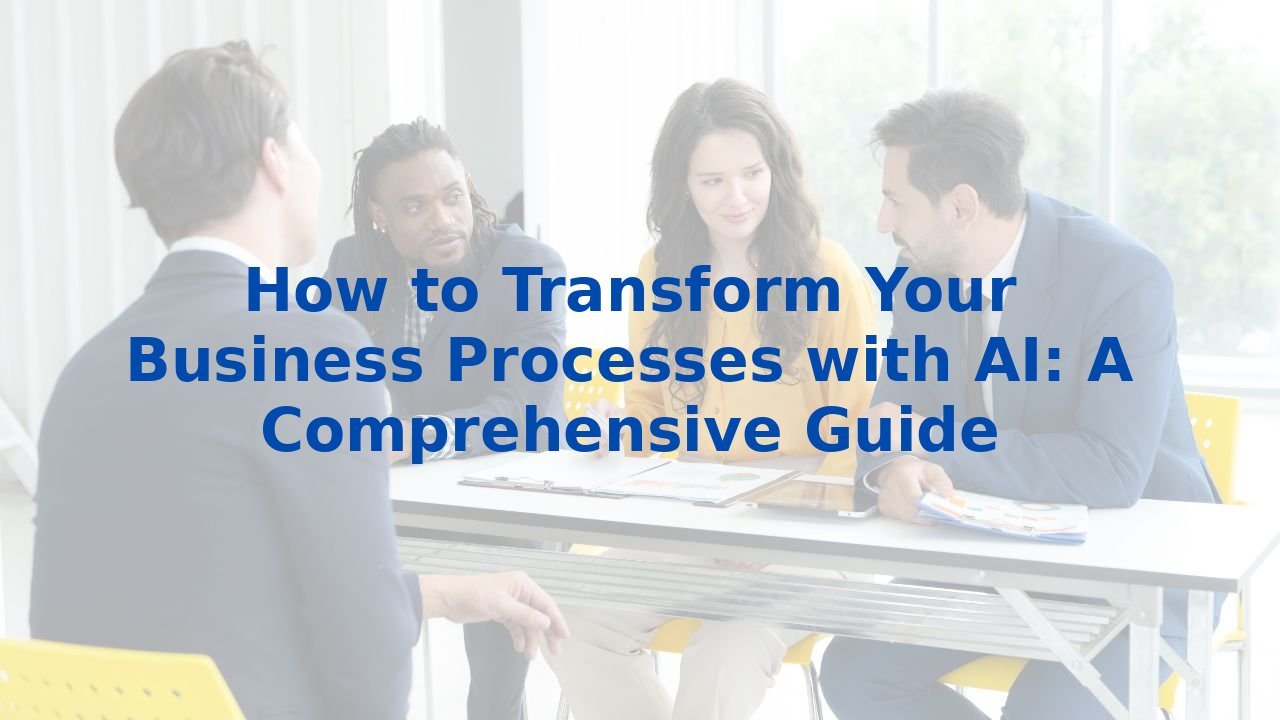How To Transform Your Business Processes with AI: A Comprehensive Guide
How To Transform Your Business Processes with AI: A Comprehensive Guide
In an era where the business landscape is constantly evolving, organizations are in a race against time to enhance their operational efficiency and maintain a competitive edge. Artificial Intelligence (AI) has emerged as a transformative force, with the potential to revolutionize how businesses operate. This guide explores the general business processes that AI can enhance, highlighting the myriad benefits that come with integrating AI into your operations.
1. Automating Routine Tasks
Imagine a world where your employees are freed from the shackles of mundane tasks such as data entry and appointment scheduling. AI is at the forefront of this evolution, automating routine functions with incredible speed and accuracy. By deploying AI-powered bots and software, organizations can significantly reduce errors and empower their teams to focus on strategic, high-value activities. The result? A workforce that is not just more efficient, but more engaged in driving innovation and growth.
2. Data Analysis and Insights
The value hidden within your data can be unlocked through AI's advanced analytical capabilities. It can sift through vast datasets and extract meaningful insights that inform critical business decisions. From identifying trends to optimizing resource allocation, AI empowers organizations to make data-driven choices that enhance performance and profitability. Embracing this data-driven mindset can redefine your approach to strategy and execution.
3. Personalized Customer Experience
In a world overflowing with options, personalization has become the key to customer loyalty. AI's ability to analyze customer behavior allows businesses to create tailored experiences that resonate with individual preferences. By delivering targeted recommendations and personalized marketing messages, organizations can foster deeper relationships with their customers, enhancing satisfaction and loyalty.
4. Predictive Analytics
What if you could predict customer demand before it occurs? AI’s predictive capabilities help businesses forecast future trends and optimize operations accordingly. By analyzing past data, AI algorithms can anticipate demand fluctuations, streamline inventory management, and refine production schedules. This foresight not only minimizes operational inefficiencies but also reduces costs, allowing resources to be allocated where they are needed most.
5. Process Optimization
At the heart of AI's impact lies its potential for process optimization. By scrutinizing workflows, AI identifies bottlenecks and redundancies, enabling businesses to restructure operations for maximum productivity. With insights gathered through AI, organizations can automate manual tasks and reallocate resources effectively, leading to quicker task completion and a leaner operational framework. The potential for innovation becomes limitless.
6. Quality Control and Assurance
Maintaining high standards of quality is imperative for any brand. AI-driven quality control systems can monitor manufacturing processes in real-time, detecting defects or irregularities before they become a problem. This proactive approach not only enhances product quality but also safeguards the brand's reputation, reducing waste and ensuring customer satisfaction remains a priority.
7. Risk Management
In a world filled with uncertainty, AI stands as a guardian against potential risks. Leveraging its analytical prowess, AI can identify emerging trends and assess market volatility. By comprehensively analyzing data, businesses can proactively mitigate risks while seizing emerging opportunities, resulting in a more resilient and agile organization.
8. Supply Chain Management
The supply chain is often considered the backbone of an organization. AI enhances precision and adaptability in this area by analyzing historical and real-time data. It allows businesses to predict demand fluctuations, optimize inventory levels, and propose efficient shipping routes. The outcome is a vastly improved supply chain ecosystem that minimizes delays and carrying costs, fostering overall efficiency.
Benefits of Training Your Employees for AI
While AI offers immense benefits, ensuring that your workforce is adequately prepared to leverage these technologies is equally crucial. Training employees in AI can lead to:
- Enhanced Productivity: Employees can shift their focus from routine tasks to more complex, creative endeavors, driving satisfaction and productivity.
- Improved Decision Making: Access to data-driven insights enables employees to make informed decisions, refining operational strategies.
- Adaptability: Continuous training ensures that employees remain agile and ready to embrace evolving technologies, keeping your organization competitive.
Conclusion
The integration of Artificial Intelligence into business processes is not just a trend; it’s a transformative movement that holds the power to redefine organizational success. From automating tasks to enhancing customer experiences, AI proves itself as a formidable tool in promoting operational efficiency. When coupled with a commitment to employee training, the advantages can be profound, creating a more agile, innovative, and competitive business environment. Embrace AI, and open the door to a future filled with possibilities.



